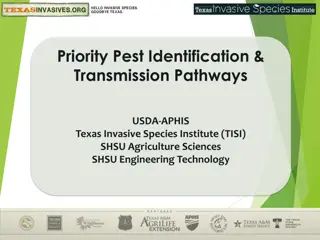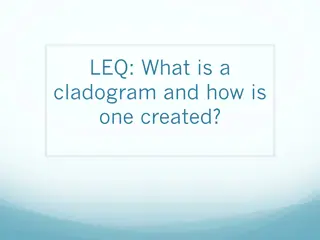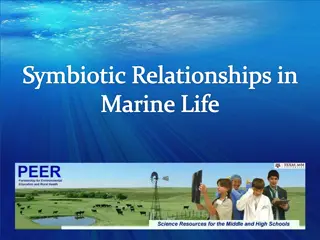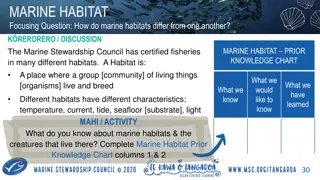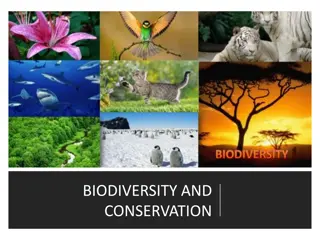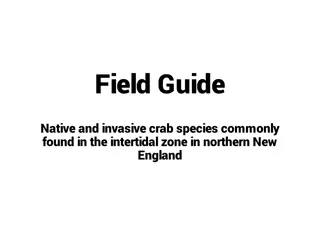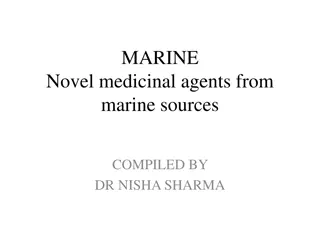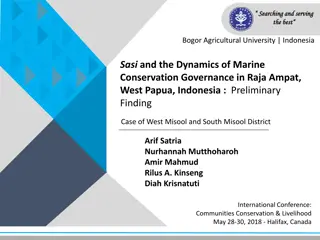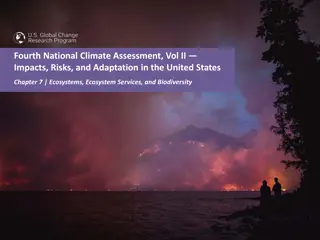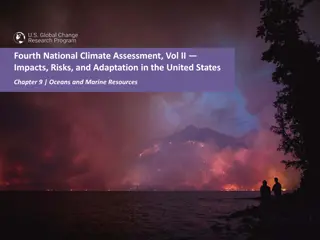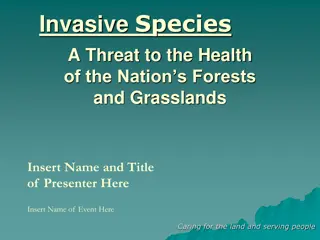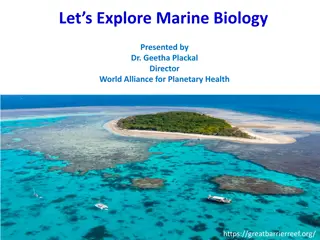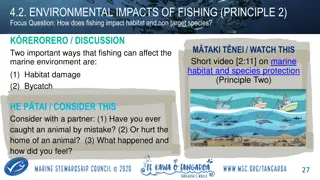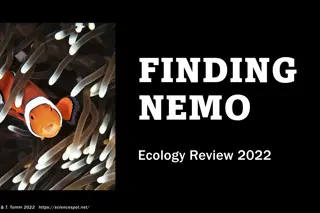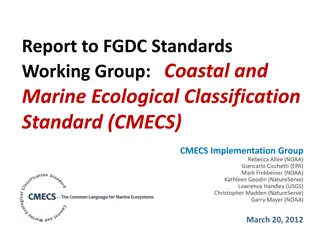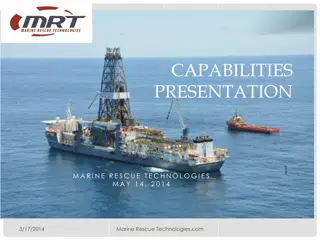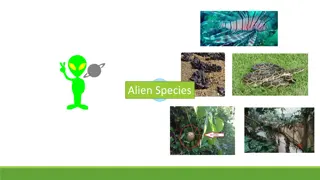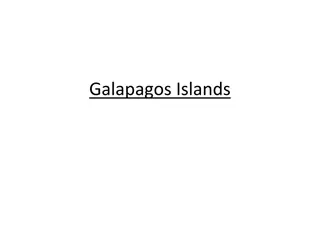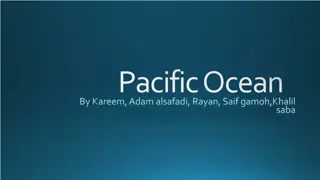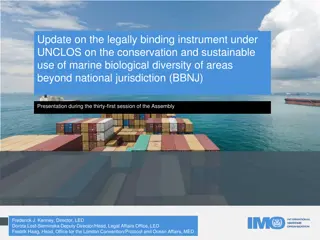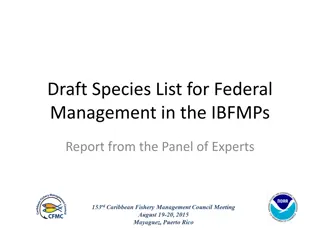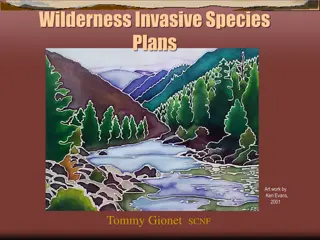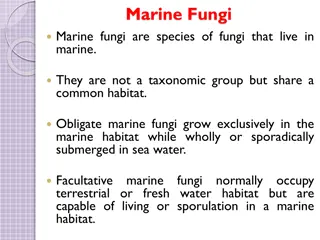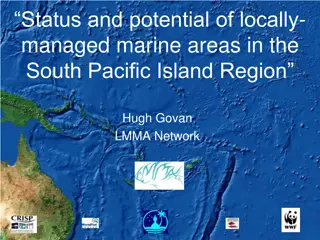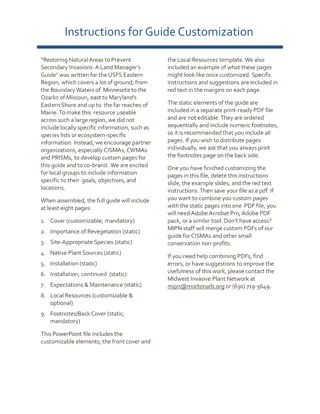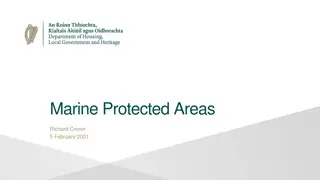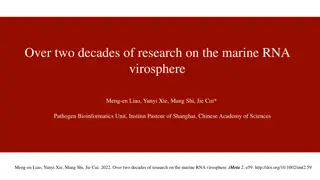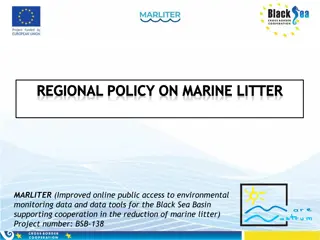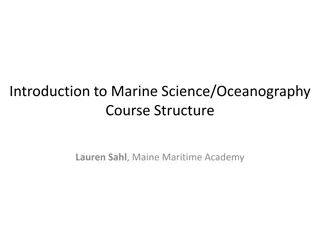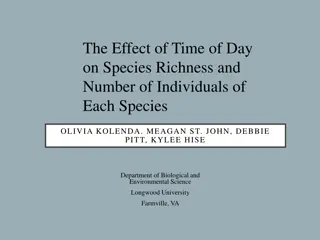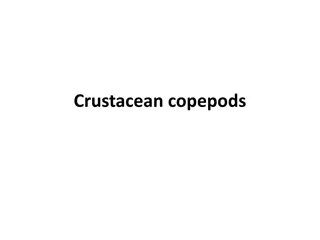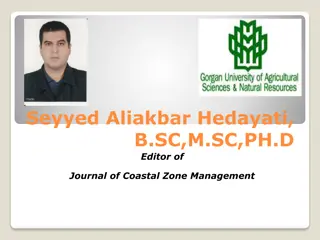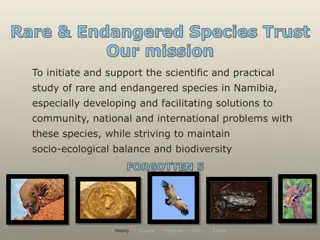Sphinx Marine - Offshore Marine Company in UAE
Sphinx Marine is an offshore marine company based in Ajman, UAE, established in 2006. They specialize in providing maritime navigation, communication, safety equipment, and services in the Gulf Area and Middle East. With a focus on customer-centricity, safety, and quality, Sphinx Marine is ISO 9001:
0 views • 20 slides
Understanding Invasive Species Transmission Pathways
Explore the identification and transmission pathways of priority pests, focusing on the measures like plant pest analysis, survey enhancement, and rapid response capabilities for invasive species management. Delve into the critical role of human interactions in creating pathways for invasive species
2 views • 17 slides
Understanding Invasive Species in Northwest Michigan
Explore the impact of invasive species in Northwest Michigan through images and data on habitat support for butterfly and moth species, the transition of non-native plants to becoming native, and the definition of what makes a species invasive. Learn about the threats posed by non-native species and
4 views • 15 slides
Understanding Cladograms and Phylogenetic Analysis
Cladograms are used in cladistics to illustrate evolutionary relationships between organisms based on shared ancestral and derived characters. They are created by grouping species by common descent, forming clades that include an ancestral species and all its descendants. Valid clades are monophylet
0 views • 11 slides
Understanding Symbiotic Relationships in Marine Life
Symbiotic relationships in marine life showcase diverse interactions where different species benefit from each other. Mutualism, such as the bond between Clownfish and Anemones, and the partnership between Goby Fish and Shrimp, exemplify how cooperation ensures survival. Additionally, the collaborat
2 views • 15 slides
Understanding Marine Habitats and Their Diverse Ecosystems
Marine habitats vary in characteristics such as temperature, current, tide, seafloor substrate, and light, influencing the communities of organisms that live within them. The certification of fisheries by the Marine Stewardship Council ensures minimal impact on local habitats, emphasizing the import
0 views • 6 slides
Understanding Biodiversity and Conservation: Importance and Key Concepts
Biodiversity is the variety of life on Earth, encompassing all species and ecosystems. Conservation efforts are crucial to preserve genetic, species, and ecological diversity. The values of biodiversity range from productive and economic to social and aesthetic. Maintaining a balance in ecosystems,
4 views • 17 slides
Field Guide to Native and Invasive Crab Species in Northern New England Intertidal Zone
This field guide provides detailed information on native and invasive crab species commonly found in the intertidal zone in northern New England. It includes identification features and distinctions among the species, serving as a useful tool for conducting intertidal green crab quadrat surveys. The
0 views • 4 slides
Marine Novel Medicinal Agents from Marine Sources Compiled by Dr. Nisha Sharma
Oceans, covering more than 70% of the Earth's surface, harbor a plethora of invertebrates and algal species, providing a rich source of medicinal compounds. Marine organisms have yielded commonly used drugs like shark and cod-liver oils, sodium alginate, agar-agar, and chitin. Various classification
1 views • 9 slides
Fascinating Marine Animals: Exploring the Diversity of Ocean Life
Dive into the mesmerizing world of marine animals and plants, where millions of species thrive in the vast ocean. Discover the enchanting features of fish, including their ability to adapt, change appearance, and employ camouflage. Explore the unique characteristics of seahorses, known for their col
1 views • 35 slides
Marine Conservation Governance in Raja Ampat, West Papua, Indonesia
Explore the dynamics of marine conservation governance in Raja Ampat, West Papua, Indonesia, with a focus on Sasi practices and the preliminary findings in the West Misool and South Misool districts. Discover the potential resources in Raja Ampat and the various types of marine conservation areas in
0 views • 22 slides
Impacts of Climate Change on Ecosystems and Biodiversity in the United States
Climate change is significantly affecting species, populations, and ecosystems in the United States. Changes include alterations in the characteristics of organisms, shifts in biological event timing, and disruptions in geographic ranges. These impacts can lead to extinctions when species can't adap
0 views • 16 slides
Impacts of Climate Change on Oceans and Marine Resources in the United States
The Fourth National Climate Assessment highlights the disruption of ocean ecosystems due to increasing global temperatures, leading to loss of habitats, changes in species composition, and food web structure. Marine fisheries face high risks from climate-driven changes, impacting distribution, timin
1 views • 10 slides
Managing Invasive Species to Safeguard our Forests
Invasive species pose a significant threat to the health of our nation's forests and grasslands, causing ecological, biological, and economic losses. This presentation highlights the impact of invasive species and underscores the importance of collaborative efforts to effectively combat this problem
2 views • 14 slides
Marine Biology: Importance, Scope, and Responsibilities
Exploring the realm of marine biology reveals its crucial role in understanding and preserving marine ecosystems under threat. This field offers diverse career opportunities, from research to conservation efforts. Marine biologists play a pivotal role in studying, monitoring, and protecting marine l
0 views • 14 slides
Environmental Impacts of Fishing: Habitat Damage and Bycatch
Fishing can negatively impact the marine environment through habitat damage and bycatch. Habitat damage occurs when fishing gear harms delicate seafloor habitats where endangered species grow. Bycatch, or unwanted catch, involves unintentionally capturing marine species like whales, dolphins, and se
0 views • 4 slides
Nautilus Marine Insurance Australian Sailing Program Overview
Nautilus Marine Insurance offers a comprehensive suite of insurance products tailored for Australian Sailing clubs, providing top-notch claims services, expert staff, and innovative solutions. With a strong focus on underwriting and customer service, Nautilus Marine is a trusted partner for marine i
0 views • 10 slides
Exploring the Ecology of Finding Nemo and the Great Barrier Reef
Delve into the fascinating world of "Finding Nemo" as it intertwines with the rich ecosystem of the Great Barrier Reef. Discover the challenges faced by marine life, from clownfish hiding in anemones to symbiotic relationships among different species. Learn about conservation issues like pollution,
0 views • 5 slides
Coastal and Marine Ecological Classification Standard (CMECS) Implementation Progress
The report highlights the development, timeline, objectives, and importance of the Coastal and Marine Ecological Classification Standard (CMECS) along with its implementation progress. It discusses the need for a national standard for classifying coastal and marine habitats, the objectives of CMECS,
1 views • 38 slides
Marine Rescue Technologies: Innovating Ocean Safety Solutions
Marine Rescue Technologies (MRT) is a leading provider of maritime survivor locating devices, retrieval systems, and rescue products. Founded in 1993, MRT serves a wide range of clients in the oil & gas industry, commercial marine sector, and maritime agencies worldwide. Their products cater to the
3 views • 15 slides
The Impact of Invasive Species on Biodiversity and Ecosystems
The introduction of foreign species can have detrimental effects on biodiversity, ecosystems, and even humans. Invasive species like the Sea Lamprey and Burmese Python disrupt natural habitats, leading to a decline in biodiversity and posing risks to native species and human populations. However, th
0 views • 13 slides
Conservation Efforts in the Galapagos Islands
Increase in human populations in the Galapagos Islands has led to habitat disturbance and overexploitation of resources, threatening native species like giant tortoises and causing invasive species to disrupt ecosystems. Conservation efforts are underway, including sustainable management practices l
0 views • 5 slides
Conservation Efforts in the Pacific Ocean
The Pacific Ocean is home to diverse marine life, including endangered species like the dugong and the vaquita. By raising awareness about the importance of protecting these animals and their habitats, such as seagrass beds, we can contribute to their conservation. Additionally, learning about phyto
0 views • 6 slides
Update on Legally Binding Instrument under UNCLOS for Marine Biological Diversity Conservation
United Nations General Assembly is developing a treaty under UNCLOS for conservation of marine biological diversity in areas beyond national jurisdiction since 2015. The objective is sustainable use of marine genetic resources, area-based management tools, environmental impact assessments, capacity-
0 views • 18 slides
Draft Species List for Federal Management in IBFMPs Report
Panel of Experts was tasked with developing a draft list of species for federal management in Island-Based Fishery Management Plans (IBFMPs). Approaches outlined for selecting species include considering factors like species occurrence in State waters, stock status, ecological importance, and econom
0 views • 27 slides
Understanding the Impact of Invasive Species in Wilderness Management
Invasive species pose a significant threat to the ecosystem by causing disruptions in biodiversity and ecosystem health. This article discusses the importance of managing invasive species in wilderness areas and provides insights into creating successful Invasive Species Plans. It sheds light on the
0 views • 22 slides
Tracking Marine Fauna: Examples from ProDelphinus Peru Leatherback Tracking Project
ProDelphinus is dedicated to conserving endangered marine fauna like sea turtles, marine otters, cetaceans, seabirds, and sharks. They use the Darwin Core Archive format and collaborate with Marine TLO for ontology mapping. The project involves tracking leatherback sea turtles and making occurrence
1 views • 8 slides
Overview of Marine Fungi and Their Habitats
Marine fungi are diverse species that inhabit marine environments, with some being obligate marine fungi while others can adapt to various habitats. They play essential roles in marine ecosystems by decomposing organic matter and interacting with other organisms. Factors affecting their distribution
2 views • 13 slides
Dive into the Marine Creatures Memory Game and Fun Facts
Embark on an oceanic adventure with a marine creatures memory game featuring two challenging levels. Test your memory skills by matching pairs of marine animals while uncovering fascinating facts about these underwater wonders. Discover unique traits of various creatures like clownfish, dolphins, an
1 views • 5 slides
Evolution of Locally Managed Marine Areas in the South Pacific Island Region
This content discusses the status, potential, and objectives of Locally Managed Marine Areas (LMMAs) in the South Pacific Island Region, highlighting the evolution from traditional purposes to modern conservation and fisheries management practices. It also provides insights into the inventory of Mar
0 views • 27 slides
Northwest Michigan Invasive Species Network Overview
The Northwest Michigan Invasive Species Network (ISN) is a Cooperative Invasive Species Management Area dedicated to managing invasive species in northwest Michigan's natural areas. Founded in 2005 and funded through grants and private donations, ISN collaborates with over 60 partners to address inv
0 views • 5 slides
Marine Protected Areas: Importance and Coverage in the Northeast Atlantic
Marine Protected Areas (MPAs) are designated areas to protect marine features such as species and habitats. They benefit the economy, society, and environment. This article discusses the significance, coverage in the Northeast Atlantic, and the ongoing efforts to expand MPA networks in Ireland.
0 views • 5 slides
Evolution of Marine Insurance in Australia: A Review of Historical Context and Reform Provisions
Exploring the evolution of marine insurance in Australia, this review delves into historical frameworks such as the Marine Insurance Acts of 1906 and 1909, as well as modern reforms influenced by the United Kingdom. Key principles adopted by the MLAANZ Committee and current recommendations surroundi
0 views • 33 slides
Decades of Marine RNA Virosphere Research
Research spanning over two decades has delved deep into the marine RNA virosphere, shedding light on the complex marine ecosystem and the characteristics of RNA viruses. Discoveries in deep marine virus taxonomy have led to significant taxonomic changes and advancements in virus classification and g
0 views • 10 slides
European Union Regulations and Directives on Marine Litter and Waste Management
Marine litter poses a significant threat to the marine environment, prompting the adoption of various international, regional, and national instruments to address the issue. Key directives such as the Marine Strategy Framework Directive and Waste Framework Directive set out measures to achieve good
1 views • 16 slides
Exploring Marine Science and Oceanography Course Structure
This marine science and oceanography course dives into the traditional structure of understanding oceans, from Earth-building processes to human interactions. It also introduces a unique approach focusing on the oil/plastics cycle, engaging students in active learning and discussions on geoethics. T
0 views • 11 slides
Effect of Time of Day on Bird Species Richness and Individuals
The study investigates how the time of day impacts the species richness and number of individuals of birds at a specific feeder in Longwood University's Environmental Education Center. Through observational studies and counting, the researchers aim to determine if there are differences in bird popul
0 views • 20 slides
Overview of Crustacean Zooplankton Diversity
Crustaceans, including copepods, cladocera, ostracods, and amphipods, play vital roles as non-gelatinous forms of zooplankton in marine ecosystems. Copepods, the dominant constituents of zooplankton, serve as chief food for commercially important fish species. The diversity of copepods is vast, with
0 views • 18 slides
Dr. Seyyed Aliakbar Hedayati - Marine Biology and Fisheries Expert
Dr. Seyyed Aliakbar Hedayati holds a Ph.D. in Marine Biology and is currently an Assistant Professor of Marine Biology at Gorgan University. His research interests include marine biology and fisheries. He has published various research papers on topics such as plasma metabolites in fish and length-w
0 views • 15 slides
Rare & Endangered Species Trust: Protecting Namibia's Vultures and Pangolins
Rare & Endangered Species Trust in Namibia focuses on studying and supporting rare and endangered species, particularly vultures and pangolins. With a mission to find solutions to conservation challenges and maintain biodiversity, the trust highlights the history, crisis, and future prospects for th
0 views • 19 slides

